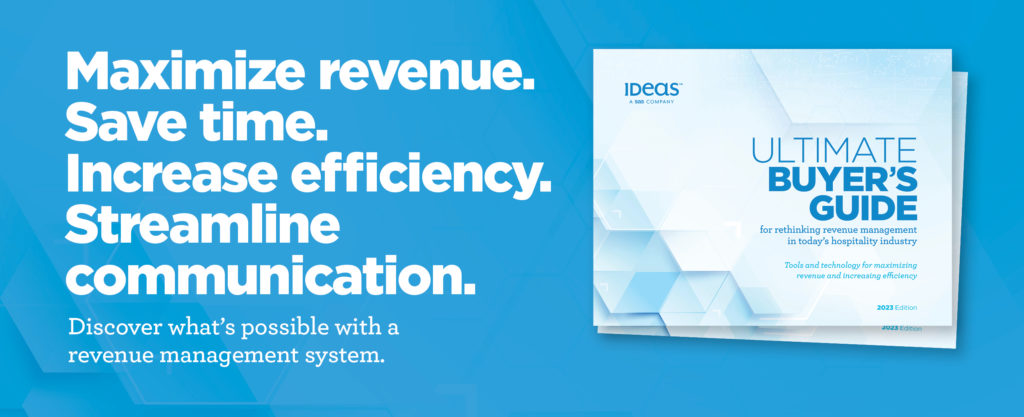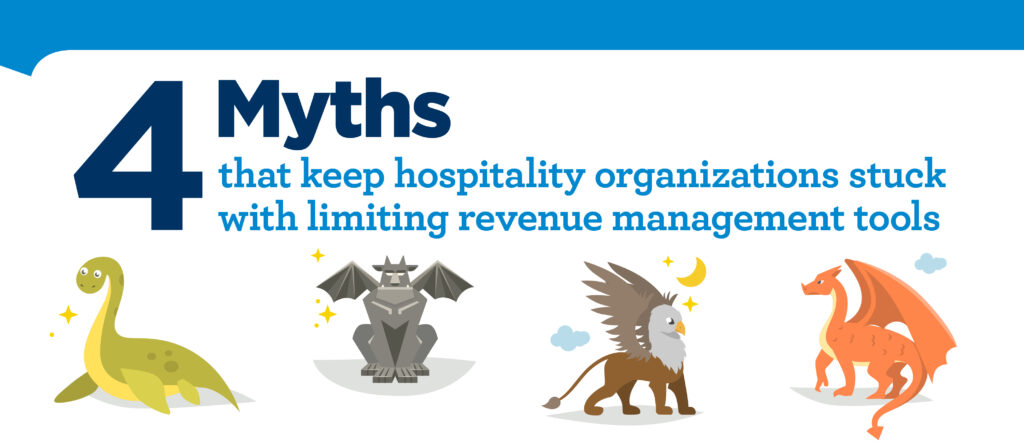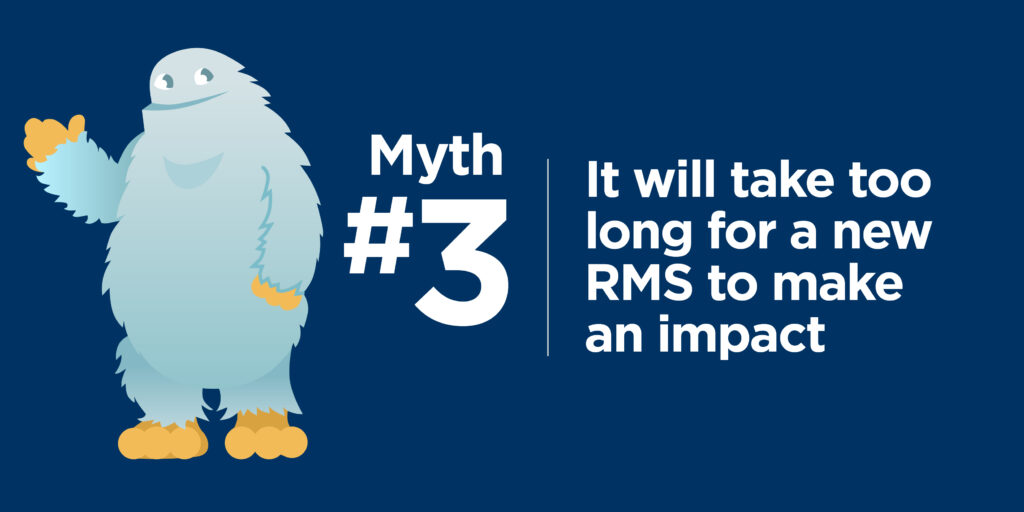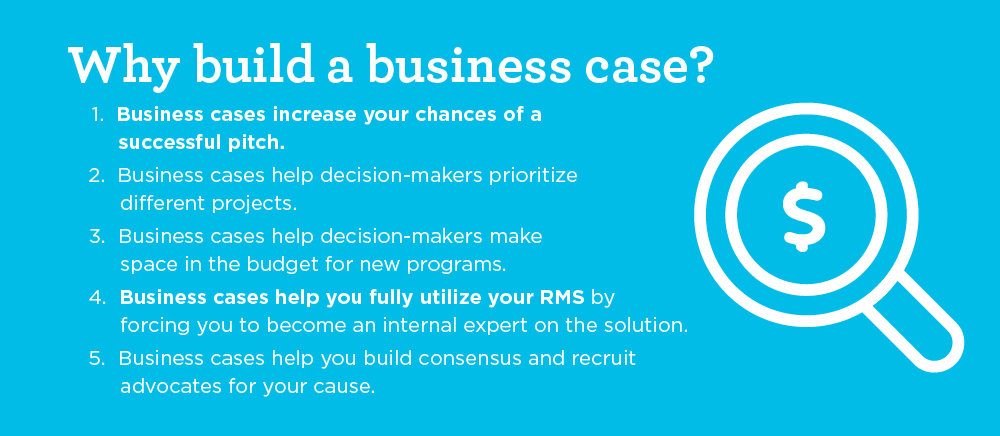So, you’re considering switching to a different, more effective revenue management system (RMS) for your hotel or hospitality organization.
But you have some doubts.
Maybe you’re catching yourself thinking:
- It’s too costly to install a new RMS for my hotel or hospitality organization.
- It will take up the precious bandwidth of my staff (and they’re already stretched thin).
- It will take way too long for my new revenue management system to learn how to price effectively.
- It’s easier to stick with the RMS I know. It’s “good enough.”
If you find yourself worrying and wondering about the concerns listed above, that’s understandable.
But here’s the reality: those concerns—however well-founded—are based on common myths.
Don’t let these myths cause you to miss out on the chance to switch to a more productive, useful hospitality revenue management solution.
To help you make the right switch to a better hotel RMS, we’ll go over the four most common RMS-switching myths so that you know what to look out for.
Let’s get started.
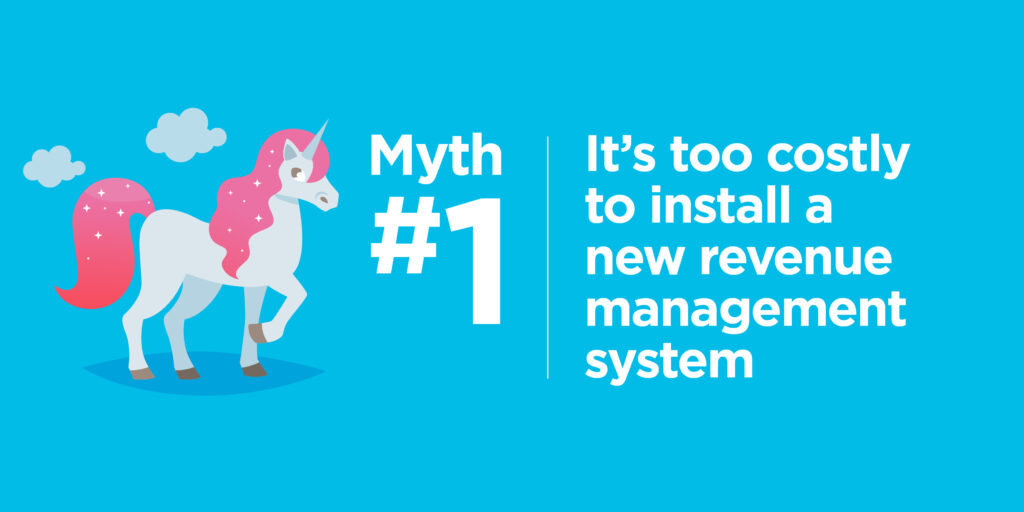
Myth #1: It’s too financially costly to install a new revenue management system
While there are costs to adopting a new RMS, there are also costs to sticking with the status quo.
If your current revenue management system causes you to miss out on gains in market share because it can’t produce accurate room-level pricing, then that might cost your business more than if you switched to a better RMS.
If your current RMS struggles to accurately manage and price group business in a way that fully optimizes revenue, you could also be losing money in the long run.
Here’s a fact: Hotels with an RMS that prices by room type (like IDeaS G3 RMS) experience a revenue uplift of 5% compared to other tools that can’t price by room type.
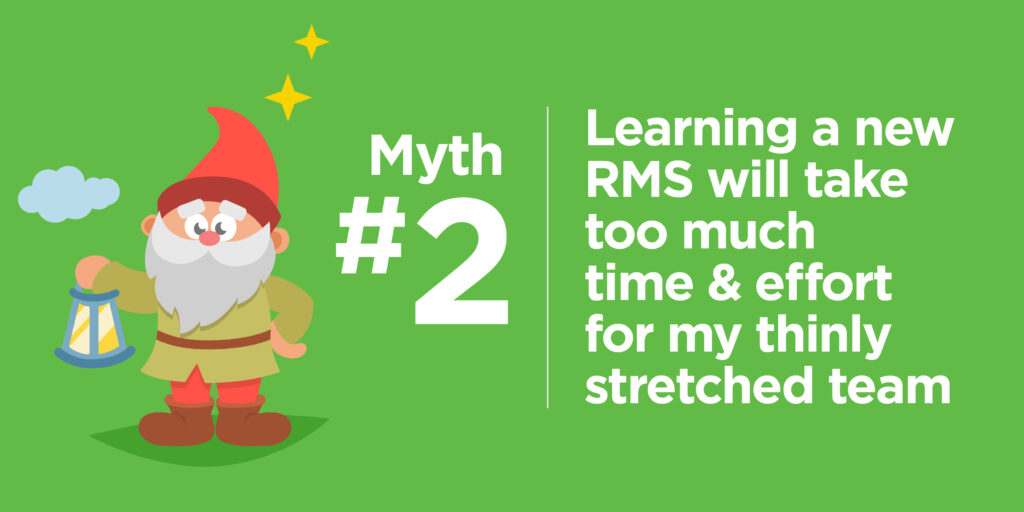
Myth #2: Learning a new system will take up too much bandwidth for my thinly stretched team
Many teams experience a slight decline in overall efficiency when switching to a new software solution.
However, this decline is typically short-lived.
Here’s the truth: Even with limited staff, onboarding a new RMS has never been faster or easier on the hotel side.
Self-paced learning empowers employees to conduct onboarding when it makes sense for them and their schedules.
Meanwhile, analytics and automation handle the heavy lifting for system setup and configuration.
And once your advanced RMS is up and running, efficiency and productivity accelerate.
When you compare your productivity while using an automated RMS to your productivity while using a rule-based pricing tool (or a spreadsheet), you’ll likely experience a massive boost in productivity from an automated system.
Myth #3: It will take too many months for a new RMS to deliver accurate forecasts & pricing
When you hire a new employee, it takes a while for them to learn their role and how your business operates.
But when you implement a hotel revenue management system like G3 RMS, which has been implemented across thousands of properties, you get a system that rolls out of the box, ready to make an immediate difference.
The artificial intelligence in G3 RMS allows it to adjust as needed and continuously learn about the new property it’s installed in.
Without oversight or programming, G3 RMS adjusts and applies pricing models that optimize the full potential of each revenue stream at the given location.
Having learned from thousands of hotels and resorts, a revenue management system like G3 RMS constantly improves its algorithms as it goes along.
This continuous fine-tuning ensures that the predictive forecasting approach of the RMS best matches your property’s demand patterns so that forecasts and pricing align with changing market conditions.
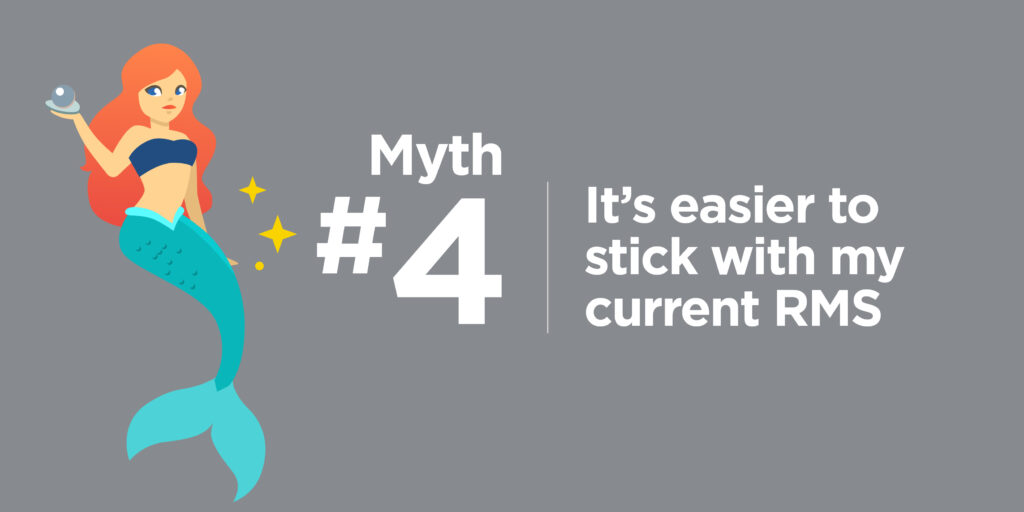
Myth #4: It’s easier to stick with what I know (and easier to not switch)
Imagine if everyone kept using the horse and buggy or the typewriter instead of switching to an automobile and a personal computer. Passing up on this technology would’ve meant missing out on living a more productive life.
So, yes, it is easy to stay with your current RMS. Doing so doesn’t require extra work. But it might not lead to any extra profits or growth either.
And in the long run, sticking with an RMS that requires near-constant rule programming and reprogramming might end up costing you more time than if you’d switched to an automated system earlier.
Think about this: Are you really saving time if you’re constantly reprogramming rules?
Or would you benefit more from a system that operates independently of rules and supervision?
The bottom line is this: If you can switch to a technology that produces insights without prompting and makes necessary price changes without you watching over it, you’re going to save time in the long run.
This is where the industry is moving in the same way that society moved on from horse-drawn carriages and typewriters.
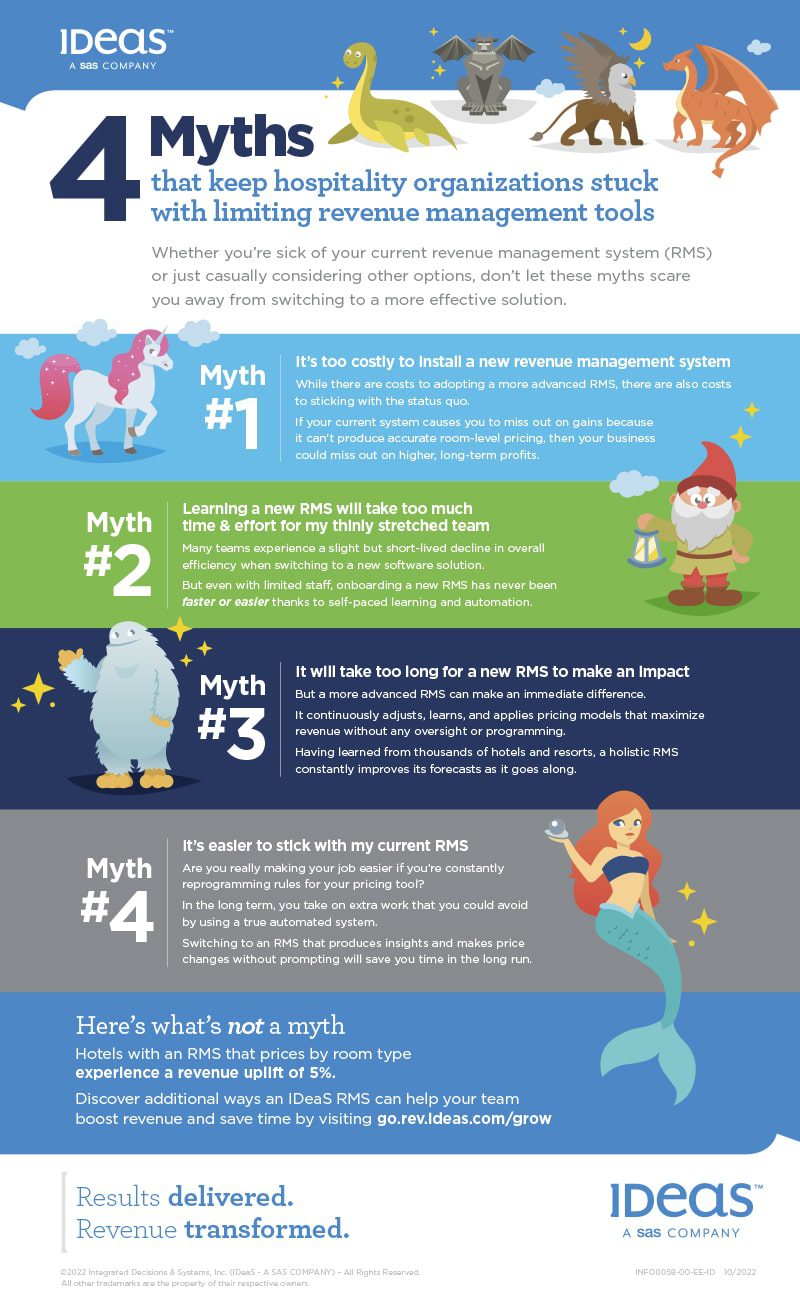
Four features of a hospitality RMS you should look for
Now that you know which myths to watch out for, you can now focus on identifying the right features of a revenue management system for your hospitality organization.
There are four basic features an RMS should have for your hotel or hospitality organization to effectively manage revenue. These features include:
- Versatile pricing: The best way to maximize revenue is to make sure your organization captures business from the most profitable groups and individuals by offering them the ideal price point. An automated hotel RMS should help hospitality organizations adjust prices with confidence and remain competitive under all circumstances.
- Proactive forecasting: The predictive analytics in an automated hotel RMS should pull data from multiple sources and historical records to understand pricing and demand patterns, length of stay, and booking behaviors.
- Manage by exception: The ideal hotel RMS automates the basic manual activities associated with revenue management (like pouring over old spreadsheets to find ideal price points). This feature gives hoteliers more time to create revenue strategies and more insights to make decisions that drive long-term revenue growth.
- Maximize groups: The right hotel RMS allows sales managers to quickly and efficiently decide whether a group event will make the hotel more money than if the hotel held the same rooms for transient business. Once a hospitality sales rep enters the details of a request for proposal (RFP) into the ideal RMS, the system analyzes expected wash, demand patterns, ancillary spending, and expected profit from both group and displaced business as a way of setting the ideal price point that maximizes profits.
So, you now know the four hotel RMS myths to watch out for and the four crucial features of a revenue management system for hospitality organizations.
That means you’re well on your way to helping your organization save more time and earn higher profits.
But if there’s still more you want to learn about how to build a case for switching to a different RMS, check out our step-by-step guide for pitching a revenue management system to your colleagues.
Here’s the bottom-line
As the legendary ice hockey player Wayne Gretzky once said about his unique approach, “Skate to where the puck is going, not where it’s been.”
When applied to the hospitality industry, the same principle holds.
You can’t risk sticking with the status quo by doing what you’ve always done.
Your guests and competitors are evolving the ways they operate. Your organization stands to benefit from evolving too.
In this case, staying ahead means partnering with proven leaders who continually deliver first-to-market capabilities.
Innovating with the guest experience and RMS technology will put you in a place where the metaphorical puck is going so you can score the winning goal.
Thinking of making the switch? We can help
Whether you’re looking for more benefits to a revenue management system or want a way to get your colleagues on board with making the switch, we can help.
Download our Ultimate buyer’s guide for rethinking revenue management in today’s hospitality industry to discover more benefits of using an automated revenue management system for your hotel or hospitality organization.
